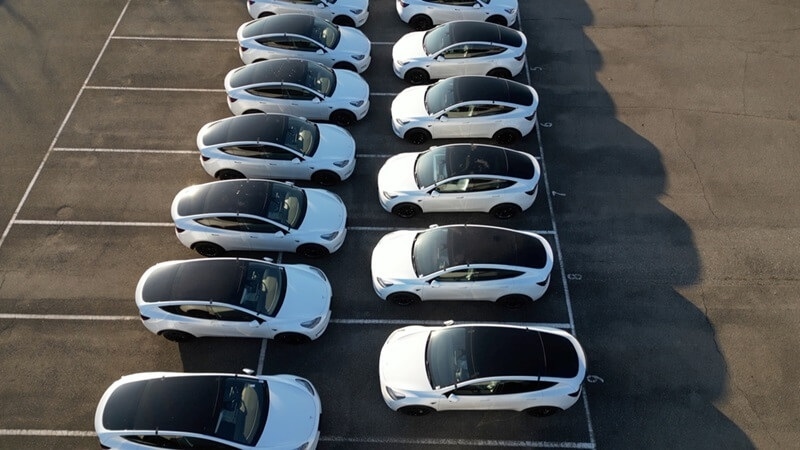
The driver is pretty much put to test when parking their automobile. Tight spaces, busy lots, and fellow drivers bugging their patience form a perfect recipe for stress. Automakers are proving in 2025 that parking can actually be really pleasant with AI in the loop. Newer AI parking solutions and increasingly intelligent AI parking systems allow the car to be parallel parked and guided in these multi-level garages without any intervention needed from the driver.
These upgrades aren’t just a gimmick. They’re part of a bigger shift toward automotive automation 2025, where AI is quietly handling the boring, low-speed maneuvers we’d rather avoid. And the brands leading this transformation are doing more than adding sensors — they’re building smart parking technology that works seamlessly in real-world conditions.

Let’s take a closer look at the top carmakers pushing AI in vehicles forward this year.
When it comes to innovation, BYD isn’t just keeping pace — it’s setting the tone. The Chinese automaker’s God’s Eye self-parking suite is available on 21 models, ranging from affordable hatchbacks like the Seagull to premium sedans. The technology supports everything from driver-assisted maneuvers to Level 4 autonomy in controlled zones.
Here’s the part that makes BYD stand out: if their self-parking system causes an accident, BYD takes full liability. That level of confidence sends a strong message to consumers who are still skeptical of AI parking solutions.
God’s Eye uses a network of LiDAR units, radar, and high-definition cameras to pinpoint parking spots, avoid obstacles, and position the vehicle perfectly every time. Whether it’s sliding into a tight parallel spot or navigating a crowded shopping-mall garage, the system handles it with uncanny precision.
Don’t Miss: Self-Driving Regulation – Explore New Rules and Impact
XPeng is taking parking automation a step further with its parking-to-parking feature. Delivered through an over-the-air update earlier this year, it allows the car to leave a starting space, navigate roads — even through complex situations like roundabouts — and park itself at the destination.
Once the system “learns” a route, the driver can activate it with a single tap. From there, the AI takes over until the car is safely parked. This isn’t just smart parking technology; it’s an example of how AI in vehicles is becoming more capable with each software update.
Like XPeng, Li Auto has rolled out a parking-to-parking feature, but with its own twist. Their system handles narrow roads, U-turns, toll gates, and parking-lot navigation without hesitation. The result is an impressively smooth end-to-end experience.
What makes Li Auto’s approach interesting is that they’re using AI parking systems to bridge the gap between on-road driving and final parking. It’s a natural extension of automotive automation 2025, where the car doesn’t just help you park — it handles the entire journey from start to finish.
Mercedes-Benz has been testing automated valet parking for years, and in 2025, it’s rolling out in select commercial garages. The Intelligent Park Pilot, developed with Bosch, works in specially equipped parking structures where the vehicle communicates with the building’s infrastructure.
Drive up, step out, and the car does the rest — finding a space, parking itself, and even returning to meet you when you’re ready to leave. It’s a polished, premium take on AI parking solutions, though for now it’s limited to specific locations.
BMW is partnering with Valeo to develop its next generation of AI parking systems, targeting full automated valet parking. Their system doesn’t just rely on sensors — it uses advanced path-planning algorithms to ensure accuracy even in awkward parking bays.
BMW is also experimenting with predictive parking, where the AI forecasts space availability before arrival. It’s a smart move that blends smart parking technology with practical convenience.
While Toyota’s Intelligent Parking Assist and Lexus’s Advanced Parking Guidance System aren’t new, they’ve received major AI-driven upgrades for 2025. These systems now use enhanced visual recognition and steering control to handle perpendicular, angled, and parallel spaces with minimal input from the driver.
By bringing these features to mainstream models, Toyota is helping make AI in vehicles accessible to more drivers, not just luxury buyers.
Related Reads: Toyota and Honda Embrace Hydrogen Fuel Cell Cars
It’s not just automakers pushing the envelope. Tech suppliers are also reshaping AI parking solutions.
These innovations are showing up in multiple brands, helping spread smart parking technology across the industry.
The latest AI parking systems are about more than convenience. They can cut down on wasted time searching for spaces, reduce fender-benders in tight lots, and even lower emissions by avoiding unnecessary idling.
In the bigger picture, they’re a crucial part of automotive automation 2025, a stage where AI quietly takes over the repetitive, low-skill driving tasks so humans can focus on the journey instead of the parking drama at the end.
Even with all these advances, there are hurdles. Regulation is still catching up, and many drivers remain hesitant to trust their cars with full control in a parking lot. Plus, truly autonomous parking systems still need ideal conditions to work flawlessly.
But the direction is clear: as AI in vehicles continues to mature, self-parking will move from a premium perk to an everyday expectation.
You may like: Smart Steps to Prepare Your Car for the Monsoon Season
In 2025, parking doesn’t have to be stressful. Whether it’s BYD taking legal responsibility for its system, XPeng and Li Auto automating the entire trip, Mercedes turning garages into AI-friendly zones, BMW refining precision parking, or Toyota bringing automation to the masses — the future is already here.
With smart parking technology becoming standard, and AI parking solutions evolving fast, the day you manually parallel park might soon be behind you. And honestly? That’s one driving skill most of us are happy to let go.
This content was created by AI